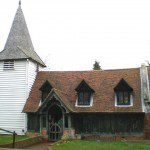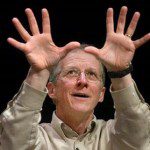Today I wrap up my interview with John Piper in this last segment. It is based on the video version of the interview, which can be viewed here. John talks about preachers he listens to and describes the circumtances which led him to the pastorate of Bethlehem Baptist Church. The three previous parts to the interview can be read at the following pages:
- John Piper on New Word Alive
- John Piper on Passionate Preaching
- John Piper on Prayer and Bible Study
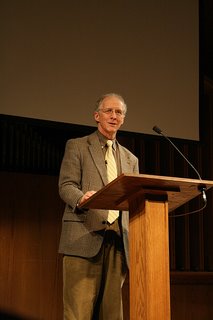 Adrian
Adrian
We have just been talking about studying the Word, and obviously books, but I guess for most preachers, they like to listen to other preachers as well. I guess you’re probably no exception to that. So who have you got on your iPOD that you’re actually listening to?
John
I do have an iPOD. It happens to sit in my speaker base in my bedroom as kind of an alarm clock. But my computer is in my study, and my treadmill is in my study. That’s the only time I ever listen to preaching—when I’m running. So three times a week, for thirty minutes or so, I’m listening to other people speak. So I download them from the Web, usually. Who are the last ones I listened to? I listened to [Don] Carson. I listened to R. C. Sproul. I listened to Martyn Lloyd-Jones. Somebody gave me the whole series of MLJ on Romans. I listen to C. J. Mahaney. I listen to John Sailhammer on the Old Testament. I listen to Carl Trueman on, what’s the topic? I can’t remember. A little while back. Basically, I’m looking for two things—one, contemporary relevant issues that I might want to dig into, or model preaching. So, whoever at that point, and they’re not always the same people, the model preachers and the ones who are talking about the things I feel like I need to get to know about.
Adrian
Okay. You’re obviously deeply committed to preaching and to pastoring, and you’ve been at Bethlehem an awful long time. I wonder, first of all, how did you make that decision to join Bethlehem, and was it a lifetime commitment at that moment, or was that something that evolved? How did it then develop into a long-term thing?
John I was teaching Bible and Greek for six years at Bethel College from 1974 to 1980. I had a sabbatical and I was working on Romans 9—the book on justification of God—the odyssey basically, Romans 9. And while I was doing that, the Lord, I believe, just kept saying through the words of that chapter, “I will be proclaimed and not just analyzed.” And I couldn’t resist it after awhile. Finally, I began to ask those who knew me best, “What would you think if I left academia and took the pastorate as a preaching pastor?” And they all said, “Do it.” So, in December of 1979, I gave my resignation and started looking for a church. I said, “I’d like to spend ten years here.” Well, they said, “Ten years would be good.” And ten years went by like that. And now it’s twenty-eight. And I have no intention of going anywhere else until I’m done.
I was teaching Bible and Greek for six years at Bethel College from 1974 to 1980. I had a sabbatical and I was working on Romans 9—the book on justification of God—the odyssey basically, Romans 9. And while I was doing that, the Lord, I believe, just kept saying through the words of that chapter, “I will be proclaimed and not just analyzed.” And I couldn’t resist it after awhile. Finally, I began to ask those who knew me best, “What would you think if I left academia and took the pastorate as a preaching pastor?” And they all said, “Do it.” So, in December of 1979, I gave my resignation and started looking for a church. I said, “I’d like to spend ten years here.” Well, they said, “Ten years would be good.” And ten years went by like that. And now it’s twenty-eight. And I have no intention of going anywhere else until I’m done.
Adrian
Do you think that kind of longevity is important for a pastor?
John
It’s important, at least in volatile urban settings. In other words, where there’s a lot of change in the people, there needs to be less change in the pastoral ministry. Where the people are stable, say in a small town that has very little coming and going, the stability lies very much in the people. In an urban setting of growth, with a lot of people in and a lot of people out, there’s no stability in the people. And if it isn’t in the staff and elders, then it’s not going to be anywhere. So the degree to which there is movement among the people, it seems to me to be good. And I think it’s healthy for the pastor himself to press on in preaching in a way that doesn’t redo the same stuff over and over again. I mean, after the first five years I thought to myself, “I would not want to do this anywhere again.” I mean, those first five years are hard. You’re figuring out everything; you’re rebuilding everything. You’re trying to make some changes. And to start all that over again instead of building on it would have felt very discouraging to me.
Adrian
So for you the pull of the church was a stronger pull than the pull of Bible college or seminary?
John
Yes, oh yes. And the reason in that day was because, in the college, I felt like, year in and year out, I had the same age group (18-22). They were culturally basically the same. Their questions were, every year, the same. They always revolved around Calvinism and free will and sovereignty, and whatever. And in the church you’ve got cradle to the grave. You’ve got ethnic and cultural differences. You’ve got people all over the spiritual map on their questions. You’ve got dying and birth. You’ve got weddings and funerals. The reality of the totality of life—what that said to me was — “If this is real, if this Book is real, it will relate to all of that instead of this little slice of humanity that comes to college.” And I just wanted to see the Word of God take root in a people.
Adrian
That’s really interesting. Would you say, then, that part of your development as a pastor and as preacher is just being there in the long-term and seeing that kind of development?
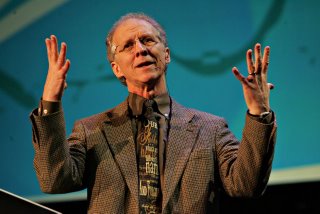 John
John
Absolutely. I had probably preached fifteen times in my life when I came to this church. I was 34 years old and I was a teacher. I taught Sunday School. I didn’t preach around. Most of my colleagues preached on the weekend in addition to teaching. I said, “I’m not going to do that. I’m going to be with my family in church, sitting with my children at my side and my wife, listening to the Word of God every weekend, and I’ll teach a Sunday School class.” So I had done a few weddings, and I had done a few little sermons here and there. But I was an absolute green preacher when I came to Bethlehem. So all of my development as a preacher has been through these 28 years in the same pulpit.
Adrian
Okay. So, you’re a busy guy because you’re a preacher there, you preach regularly. You go to all these conferences. And I’ve noticed you almost always bring, if not a completely brand new message, at least a newly reworked versi
on of it, perhaps slightly different . . . How do you manage to find all that time? Or is it just that you prioritize that and don’t watch too much TV?
John
I don’t watch any television. I don’t have a television.
Adrian
That’s what it is probably.
John
That certainly helps. And I have a wonderful wife who tolerates a very absent husband, even when I’m home. I ask her—I’m always taking her temperature as we do our dates on Mondays and go out. “How we doing, Noel? Do you want to make any changes?” She’s just so incredibly flexible that I married the right woman. And ever since we’ve been married, I’ve always worked, both in the day and in the evening. I’ve raised four sons, and now I’m working on one daughter. And they’re all married, and they have sons, and they’re following the Lord. So I feel some deep, deep gratification about that. But I always took from 5:30 to 7:00, and that was their time. I ate with them and then we had play time. We were kicking the ball around in the backyard or we were building towers and knocking ‘em down — this is your time. And I went to all their ballgames. A pastor has his own time. He can do whatever he wants. So 3:30 in the afternoon, while other guys are working, I’m banging my fists at the soccer match, or you’d call it football, to make my son, Benjamin, run faster . . .
Adrian
You played soccer?
John
I didn’t — I watched it.
Adrian
But, no, still, I mean . . .
John
Oh, I love it. We try, we try! (Laughing.)
Adrian
You have David Beckham now, of course.
John
Well, he did score a goal the other day. I think it was headlines. One goal out of this billion dollar deal. So . . . where were we?
Adrian
We were talking about football playing . . . you were just talking about all the time . . . .
John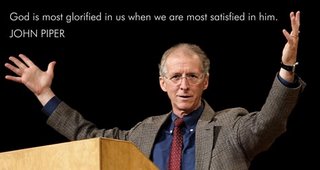 Oh, the time to do things, yeah. The point was that even though I work in the evenings (at 7:00 I’m back in my study or with a book in my hand or at some meeting) and Noel is doing her handwork, or working on her projects, and I’m working away. But, really, the key is — I’ve been in the church long enough that they let me do what I want to do. And we’ve got such diversification staffing, that I’m the preacher guy. They want me to feed this flock on the weekend, and they want me to provide vision for the staff. That’s my title — Pastor of Preaching and Vision. I’m here in Wales, and I’ll be back to preach next Sunday, and most of them won’t even know I was gone.
Oh, the time to do things, yeah. The point was that even though I work in the evenings (at 7:00 I’m back in my study or with a book in my hand or at some meeting) and Noel is doing her handwork, or working on her projects, and I’m working away. But, really, the key is — I’ve been in the church long enough that they let me do what I want to do. And we’ve got such diversification staffing, that I’m the preacher guy. They want me to feed this flock on the weekend, and they want me to provide vision for the staff. That’s my title — Pastor of Preaching and Vision. I’m here in Wales, and I’ll be back to preach next Sunday, and most of them won’t even know I was gone.
Adrian
Yeah, sure. You write books. What would be the three books that you’ve written that would be your most important books, in your opinion? Three most important books you’ve written, or three significant . . .
John
I will be interested to watch from heaven to see what the answer to that question will prove to be, because I don’t think my answer really has any authority. I don’t know. Don Carson told me he thought Pleasures of God was the most important thing I’ve done, so I think I would put that in the top three. I’m going to put Desiring God there just because it’s the seminal book from which everything else flowed. And after those two, God’s Passion for His Glory maybe. That’s my [Jonathan] Edwards—Edwards is half of that and I’m half of that. And because Edwards is so important, and that essay, The End for Which God Created the World, is so absolutely foundational to everything I do and what I think, that may be the other one.
Adrian
Great. Well look, thanks very much for joining us, John. It’s just been wonderful to have a few moments here just to pick your brains . . .
John
Yeah. I wish we had more time. Thank you very much!
Adrian
God bless.









